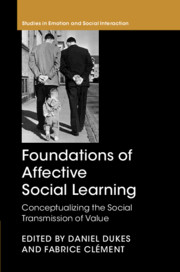Book contents
- Foundations of Affective Social Learning
- Studies in Emotion and Social Interaction
- Foundations of Affective Social Learning
- Copyright page
- Dedication
- Contents
- Figures
- Contributors
- Preface
- A difficult introduction to affective social learning
- Part I On the evolutionary foundations of affective social learning processes
- Part II On human development and affective social learning
- Part III On the mechanics of affective social learning
- Chapter 5 Calibrating emotional orientations
- Chapter 6 Socio-affective inferential mechanisms involved in emotion recognition
- Chapter 7 Learning from others’ emotions
- Part IV Applications of affective social learning
- Conclusion
- Index
- Studies in Emotion and Social Interation
- References
Chapter 5 - Calibrating emotional orientations
Social appraisal and other kinds of relation alignment
from Part III - On the mechanics of affective social learning
Published online by Cambridge University Press: 09 August 2019
- Foundations of Affective Social Learning
- Studies in Emotion and Social Interaction
- Foundations of Affective Social Learning
- Copyright page
- Dedication
- Contents
- Figures
- Contributors
- Preface
- A difficult introduction to affective social learning
- Part I On the evolutionary foundations of affective social learning processes
- Part II On human development and affective social learning
- Part III On the mechanics of affective social learning
- Chapter 5 Calibrating emotional orientations
- Chapter 6 Socio-affective inferential mechanisms involved in emotion recognition
- Chapter 7 Learning from others’ emotions
- Part IV Applications of affective social learning
- Conclusion
- Index
- Studies in Emotion and Social Interation
- References
Summary
Interpersonally presented emotions help to calibrate people’s orientations to things happening in the shared environment. For example, social referencing involves one person seeking clarification of the appropriate appraisal of an object, event, or person, and another person responding with an emotional orientation that disambiguates things. However, this paradigmatic case represents only one of the possible ways in which emotions affect other people’s physical or mental attitudes. In other cases, emotion-related responses affect other people’s orientations independent of their explicit informational content. Further, emotional knowledge may be co-constructed dynamically rather than transmitted unidirectionally from one person to another. In these cases, affective social learning need not involve changes in the perceived meaning of emotional objects, but rather adjustments in interactants’ orientations to what is happening. This chapter suggests ways of extending and going beyond existing methodological and theoretical approaches to emotional influence and identifies some of the blindspots of previous research.
Keywords
- Type
- Chapter
- Information
- Foundations of Affective Social LearningConceptualizing the Social Transmission of Value, pp. 117 - 141Publisher: Cambridge University PressPrint publication year: 2019
References
- 4
- Cited by

